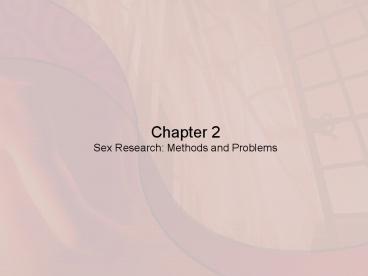Chapter 2 Sex Research: Methods and Problems - PowerPoint PPT Presentation
1 / 14
Title:
Chapter 2 Sex Research: Methods and Problems
Description:
Chapter 2. Sex Research: Methods and Problems. Sexology. The study of sexuality ... purpose is to understand, predict and control sexual behavior. Non ... – PowerPoint PPT presentation
Number of Views:533
Avg rating:3.0/5.0
Title: Chapter 2 Sex Research: Methods and Problems
1
Chapter 2Sex Research Methods and Problems
2
Sexology
- The study of sexuality
- purpose is to understand, predict and control
sexual behavior
3
Non-experimental Research Methods
- Case studies
- single subject or small group
- advantages
- unique in depth-information about atypical cases
or behavior - disadvantages
- variables cannot be controlled
- hard to generalize
- often based on self-report
4
Non-experimental Research Methods (cont.)
- Survey Studies
- small to large samples of people
- face-to-face interviews or questionnaires
- reliability increases with
- representative sample
- random sample
5
Non-experimental Research Methods (cont.)
- Survey Studies
- advantages
- questionnaires anonymity may improve honesty,
cheaper - interviews more flexible, may improve clarity
understanding
6
Non-experimental Research Methods (cont.)
- Survey Studies
- disadvantages
- self-selection and nonresponse
- demographic bias
- same distortion biases as case study
7
Non-experimental Research Methods (cont.)
- Direct observation studies
- small to moderate samples of people
- reliability increases with
- representative sample
- accuracy of recording devices
- advantages
- use of objective measures
- disadvantages
- self-selection, reactivity, expense
8
The Experimental Method
- Procedures
- small to moderate samples of people
- the independent variable is manipulated
- changes in the "dependent variable are measured
- reliability validity increase with
- random selection
- random assignment
9
The Experimental Method (cont.)
- Advantages
- lowers the influence of other variables
- can make cause-effect conclusions
- Disadvantages
- being measured may affect actions
- artificiality of laboratory setting
10
Technologies in Sex Research
- Electronic devices for measuring sexual arousal
- penile strain gauge measures slightest change in
penis size - vaginal photoplethysmograph measures increased
vaginal blood volume
11
Technologies in Sex Research (cont.)
- Computerized assessment of sexual behavior
- computer assisted self-interview (CASI)
12
Ethical Guidelines for Human Sex Research
- No pressure or coercion for participation
- Informed consent and right to refuse to
participate - Confidentiality and anonymity
- Question of deception
- Institutional ethics review
13
Feminist Theory Sex Research
- Biases due to past domination by white,
middle-class males - focus on penis-vagina sexuality
- focus on heterosexuality or gay males
- lack of female health focus
- focus on controlling female fertility
- lack of qualitative research methods
14
Evaluating Research Questions to Ask
- Why was the research done? Who did the
research? What biases are there? - Who were the subjects? How were they selected
assigned to groups? - How was the research conducted? What methods
were used? - Where was the research reported? What additional
support is there?































